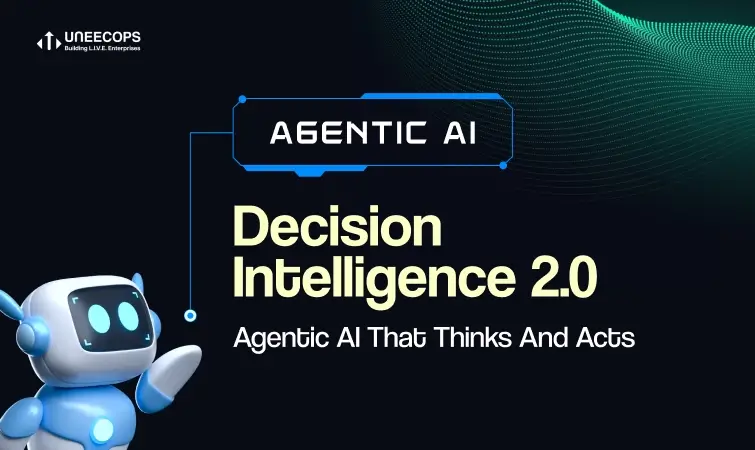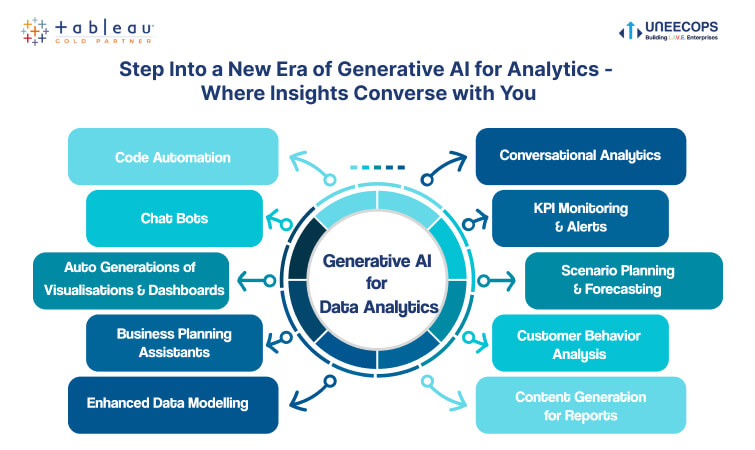It’s year-end— and the happy fact is that the pandemic is finally behind us. In 2023, every modern digital enterprise will have to look beyond the ‘obviously digital’ to create a competitive advantage.
Stepping into a new year would mean truly digital enterprises have to evolve and move beyond the sudden jump in technology adoption after the pandemic. The digital revolution had set off near-panic among leaders and executives who started using data to elevate their decision-making ability.
2023 is no longer about data; it is about generating value from data
The initial outcome of digital transformation is the creation of a constant data flow, a method used to power the entire organization. However, the business transformation journey begins after this point when the data is broadly generated from across the organization and collected for data-driven decisions.
Let’s simplify this.
Each company has a constant flow of information coming in per minute. That data flows through various channels, departments and functions. It gets broken down, arranged and assimilated. As enterprises become more automated, this data is compiled on ERP systems to derive actionable insights. Then comes analytics to power better datasets and impactful strategies.
We’re implying that companies across all industries, including financial services, pharma, manufacturing and automotive services, are increasingly focused on data flow to better leverage their data, improve selling, and ultimately differentiate from their competition. As modern enterprises leverage IT systems, Gartner predicts that worldwide IT spending will grow 5.1% in 2023. This means ERP system, technology innovation and analytics tolls will be the name of the game.
Giving context, we break down the data process in each business function.
STEP 1 – Data Collection
As discussed earlier, a business usually involves many functions, including finance, marketing, accounting, sales, production, R&D, etc. All of these departments generate loads of data on a daily basis. So, the first step is collecting data from each department. Modern digital enterprises streamline the data collection process using the latest technology solutions. ERP and CRM are enterprise-grade software that help leaders filter data. With financials, CRM, analytics, sales, inventory management, reporting and much more in a single, easy-to-use solution, you get everything you need to manage data effectively.
Once you compile information at the central database, you can gain cross-departmental visibility to analyze root-cause, discover potential opportunities and loopholes and gain massive gains. This empowers your business to run agile and in real-time as people spend less time connecting disconnected systems. Here are some of the capabilities of ERP/CRM that modern enterprises can leverage for optimizing data in each function:
- Production – Manage inventory and streamline material resource planning
- Finance and Accounts – Help manage finance operations and automate every monetary process – from accounting to risk management.
- Reporting – Create detailed reports on all aspects of your business processes
- Sales – Manage the complete order-to-pay cycle, including receipts, invoices, returns and payments
- Planning – Improve resource planning, project management and more
- Supply Chain – Shrink supply chain costs, accelerate cycle times and minimize scrap
- Marketing – Store all critical customer and marketing campaign data in one place
Now that you have data collected and arranged accurately, you need to get value out of it.
Step 2 – Data Visualization/ Data Analytics
With analytics tools and solutions, you can get maximum value from your data, deliver trusted insights, and employ extensive planning and analysis across your business. Analytics software like Tableau and Power BI play a key role here. These are leading business intelligence and data analytics tools that bring the data together, enabling data-driven decision-making. Here are some of the capabilities of analytics tools that modern enterprises can leverage for optimizing data in each function:
- Finance – Analyze accounts receivable, monitor travel and expense data, drill down into cash flow details, forecast future expenses, etc.
- Marketing – Gain insight into your social and Adword spending, website performance, digital media spending, customer journeys and more.
- Sales – Empower sellers with actionable insights to close big deals and analyze business health in a single view.
- Production – Find answers to inventory location, costing and COGS. Then, analyze and make predictions for better business outcomes.
- Supply Chain – Deliver more with less across your supply chain efficiently with impactful data insights.
STEP 3- Better Data Quality and Decisions for Business Transformation
It’s like a circular flow. Building a modern digital enterprise involves data collection as the first step, which is where ERP and CRM systems are helpful. After that, data analytics is done for better decision-making using tools like Tableau and Power BI. This, in turn, helps create better quality data from digital systems such as Cloud ERP and CRM – enabling enterprises to leverage innovations in their business transformations. Here is how better data quality helps organizations:
- With connected marketing, commerce, sales and service information, you can power your customer experience from demand to supply chain and delivery.
- Deliver results right away with ready-to-work processes built on proven industry best practices
- Tackle your top business priorities quickly and expand as your needs evolve
- Stay ahead of competitors by constantly discerning the data you need
- Build your own breakthroughs with technology robustness and cloud enablement
Powering Intelligent Enterprise Transformation in 2023
Companies looking for ways to turn information into insight by leveraging data must establish a strategic plan for using analytics and insights derived from data. Gartner predicts that a digital immune system – one that combines multiple software development strategies to protect against risks will be the future.
Thus, the right software or technologies are essential when considering a data strategy because they can help ensure data are properly transferred and secured as it moves through its lifecycle.
Build your modern digital enterprise: Partner with an experienced technology team
Uneecops technology solutions and services have helped 1800 clients transform their enterprise IT across 18 industries over the last 15 years.
This brings us closer than ever to a point where we are able to create “intelligent enterprises” where systems and processes support each other to align data in the most efficient way possible.
With Uneecops business automation, transformation and performance solutions, you can build not just an intelligent but sustainable enterprise. We have the world’s #1 CRM platform ‘Salesforce’, Gartner-rated SAP ERP solutions and leading Analytics tools such as Power BI and Tableau. We have experts to guide you through implementation, support and a complete automation journey – everything you need for building a modern enterprise in the new financial year.
Explore transformation initiatives that are sustainable, future-proof, and scalable with Uneecop







